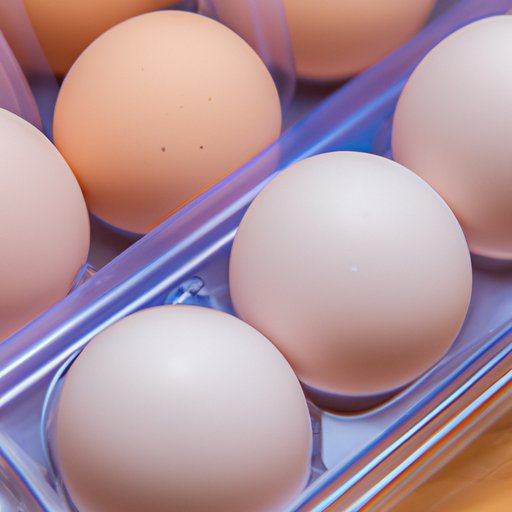
Introduction
If you’re an avid home cook or baker, you might be worried about the risks of consuming raw or undercooked eggs. While eggs are a versatile and nutritious ingredient, they can also harbor harmful bacteria such as salmonella. In this article, we’ll explore the importance of pasteurizing eggs and provide you with a step-by-step guide to doing it safely at home.
The Importance of Pasteurizing Eggs
Raw or undercooked eggs can pose serious health risks, especially for children, pregnant women, and people with weakened immune systems. Consuming contaminated eggs can lead to symptoms like vomiting, diarrhea, fever, and abdominal cramps. In some cases, it can even be fatal.
There have been several high-profile outbreaks of egg-borne illnesses in recent years. In 2018, millions of eggs were recalled in the United States due to an outbreak of salmonella. The year before, a salmonella outbreak linked to backyard chickens sickened over 200 people across the country.
A Step-by-Step Guide on How to Pasteurize Eggs at Home
Fortunately, it’s possible to pasteurize eggs at home to make them safe for eating. Here’s how:
General Safety Tips
Before you begin, it’s important to take some general safety precautions when handling raw eggs:
- Wash your hands thoroughly before and after handling eggs.
- Use eggs that are fresh and clean. Avoid cracked or dirty eggs.
- Store eggs in the refrigerator at 40°F (4°C) or below to prevent the growth of bacteria.
Method of Heating Boiled Eggs in Hot Water
The most common method of pasteurizing eggs involves heating them in hot water. Here’s how:
- Fill a pot with enough water to fully submerge the eggs.
- Using a thermometer, bring the water to a temperature of 140°F (60°C) to 150°F (66°C).
- Gently place the eggs in the water using a slotted spoon.
- Keep the water temperature at or above 140°F (60°C) for the duration of the pasteurization process. This can take anywhere from 3 to 5 minutes, depending on the size and thickness of the eggs.
- Remove the eggs from the water and let them cool.
- Use the eggs immediately or store them in the refrigerator at 40°F (4°C) or below.
Duration of Time Required for Pasteurization
The length of time required for pasteurization depends on the size and thickness of the eggs. For small or medium eggs, 3 minutes of heating is sufficient. For larger or jumbo eggs, you may need to heat them for up to 5 minutes.
Alternative Methods of Pasteurizing Eggs
In addition to heating in hot water, there are other methods of pasteurizing eggs:
- Microwave: Crack the egg into a microwave-safe bowl or ramekin. Cover loosely with plastic wrap and microwave on high for 30 seconds to 1 minute, depending on the wattage of your microwave. Stir the egg and microwave in 10-second intervals until it is fully cooked.
- Sous Vide: Place the egg in a sous vide bag and submerge it in a water bath at 135°F (57°C). Cook for 1 hour.
- Steam: Place the egg in a steamer basket or rack over a pot of boiling water. Cover and steam for 6 to 8 minutes.
Each method has its pros and cons. For example, the microwave method is quick and easy, but it can be difficult to control the temperature and texture of the egg. The sous vide method is precise and consistent, but it requires special equipment. The steam method is gentle and preserves the texture of the egg, but it takes longer than other methods.
Benefits of Using Pasteurized Eggs in Cooking
Using pasteurized eggs in recipes can help reduce the risk of foodborne illness. Pasteurized eggs are also fresher and have a longer shelf life than unpasteurized eggs. Here are some advantages of using pasteurized eggs:
- Food safety: You can use pasteurized eggs in raw or undercooked recipes like Caesar salad dressing, mayonnaise, or eggnog without worrying about the risk of food poisoning.
- Texture and appearance: Pasteurized eggs have a consistent texture and appearance, which is important in recipes like mousse or custard.
- Convenience: Pasteurized eggs are available in many grocery stores, so you don’t have to go through the hassle of pasteurizing them yourself.
Recipes that typically call for pasteurized eggs include anything that involves the use of raw or undercooked eggs, such as mousses, icings, and sauces. You can also use pasteurized eggs in recipes that involve eggs as a binding agent, such as quiches or cakes.
Frequently Asked Questions About Pasteurizing Eggs
Here are some common questions and answers regarding pasteurizing eggs:
- How long do I need to boil eggs to pasteurize them? The length of time depends on the size and thickness of the eggs. For small or medium eggs, 3 minutes of heating is sufficient. For larger or jumbo eggs, you may need to heat them for up to 5 minutes.
- How long do pasteurized eggs last in the fridge? Pasteurized eggs can last up to four weeks in the refrigerator.
- Can I still use pasteurized eggs to make dishes like sunny-side-up eggs? Yes, you can still use pasteurized eggs in any recipe that calls for raw or undercooked eggs. However, the egg may not have the same texture or appearance as a non-pasteurized egg.
If you want to learn more about pasteurizing eggs, you can check out resources from organizations like the FDA or the American Egg Board.
Conclusion
Pasteurizing eggs is an important step in ensuring food safety when cooking or baking. By following the steps and safety tips outlined in this article, you can safely and easily pasteurize eggs at home. Remember to always handle raw eggs with care and to cook them thoroughly to prevent the spread of harmful bacteria.





